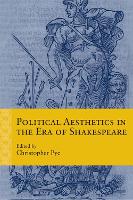Political Aesthetics in the Era of ShakespeareAuthor :
Paperback
Published : Tuesday 30 June 2020
You may also like ...

by
Paperback
30 Jun 2020
>>
€45.73
Extended stock - Dispatch 5-7 days
Description
Examines the relationship between art and politics in the work of William Shakespeare and others in the early modern era, with a focus on the relation between aesthetics and sensory experience. This collection will be an important resource for students of Shakespeare and the Renaissance, and for those interested in political and aesthetic theory.
This book examines the relationship between art and politics in the work of William Shakespeare and others in the early modern era, with a focus on the relation between aesthetics and sensory experience. From the 1980s, the turn to political concerns in Renaissance studies was dictated by forms of cultural materialism that staked their claims against the aesthetic dimension of the work. Recently, however, the more robustly political conception of the aesthetic formulated by theorists such as Theodor Adorno and Jacques RanciEre has revitalized political aesthetics generally and early modern studies in particular. For these theorists, aesthetics forms the crucial link between politics and the most fundamental phenomenological organization of the world, what RanciEre terms the distribution of the sensible. Taking up this expansive conception of aesthetics, Political Aesthetics in the Era of Shakespeare suggests that the political stakes of the literary work - and Shakespeare's work in particular - extend from the most intimate dimensions of affective response to the problem of the grounds of political society as such. The approaches to aesthetic thought included in this volume explore the intersections between the literary work and the full range of concerns animating the field today: political philosophy, affect theory, and ecocritical analysis of environs and habitus. At the same time, political aesthetics holds its own distinctive promise for reopening the question of the relation between art and the political domain. This collection will be an important resource for students of Shakespeare and the Renaissance, and for those interested in the promise of current political and aesthetic theory.
Reviews